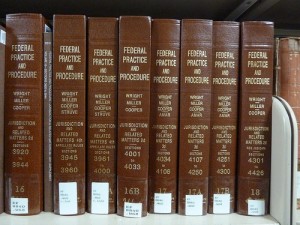Monday Morning Review: Local Governments in the Federal Appellate Courts
Posted
14 Apr 2014 in Monday Morning Review
Here are last week's published decisions involving local governments: Third Circuit
Third Circuit
- Thomas v. Cumberland County, No. 12-3959 (Apr. 11, 2014) (in suit alleging that the County failed to properly train officers to prevent attack by other inmates, vacating the district court's order of summary judgment for the County because a reasonable jury could find that the County acted with deliberate indifference).
- Rouster v. Saginaw County, No. 13-1673 (Apr. 9, 2014) (affirming district court decision that medical staff was not deliberately indifferent to jailed individual's medical needs).




 By Lisa Soronen [We are thrilled to have a guest post from Lisa Soronen, executive director of the
By Lisa Soronen [We are thrilled to have a guest post from Lisa Soronen, executive director of the 



